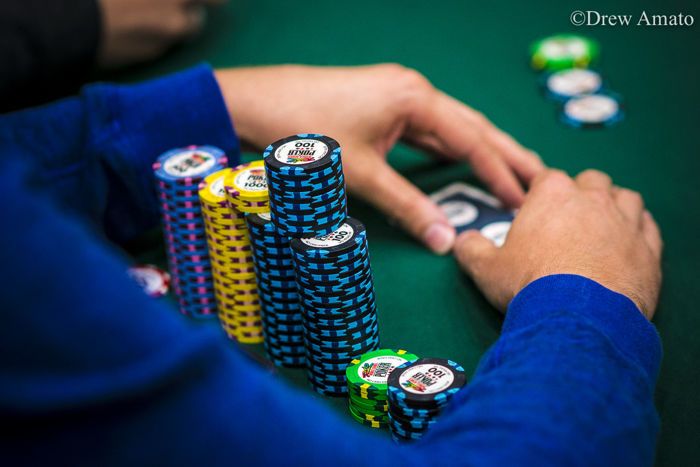Seems Risky: A Three-Barrel Bluff for Your Entire Stack in WSOP Main Event

Few things are as exciting, or risky for that matter, as a three-barrel bluff in poker. It takes heart, commitment, and the ability to set fear aside. When executed in the World Series of Poker Main Event, the intensity is amplified considerably.
I encountered one such spot in the 2019 WSOP Main Event. Let��s take a look at the hand, which took place with the blinds at 1,500/3,000/3,000. It began when the UTG+1 player raised to 7,500 off an 81 BB stack. I looked down at the K?Q? in the hijack with 83 BBs in my stack.
This is a situation where you can either raise or call, I think either play is fine. With the offsuit cards, I tend to lean towards a three-bet. That��s because the suited hands play a little better than the offsuit hands postflop. I don��t mind taking this down preflop, and if they call I can still flop a big pair. Plus, if you never three-bet bluff it makes your opponent��s life easy when you do three-bet.
"Neither player connects very well at all on this flop, which means the three-bettor usually has a bit of an advantage."
So, we do three-bet to 20,000, the original raiser calls, and the flop comes down 8?4?3?. Our opponent checks, and if I bet I��m going to put my opponent in a tough spot immediately if he doesn��t have a pair. I decide to bet 20,000, which is what I��d do with my entire range. Neither player connects very well at all on this flop, which means the three-bettor usually has a bit of an advantage.
Granted, I��m going to get called a lot when I bet 20K into 47K, so you might be wondering why even bluff if I��m going to get called? Well, it��s because I have the ability to bluff on the turn.
Our opponent does call and the turn was the 3?, which our opponent checked. Not it's decision time. Do I bet the turn and river to try and get my opponent off a hand like jacks or an ace-high, or do I check and concede the hand?
Do you really want to be three-barrel bluffing off your stack in the WSOP Main Event? Well, my range is aces, kings, and queens, maybe an ace-three suited, right, but it��s important to have some bluffs every once in a while. I do bet 40,000 into 87,000. This is essentially setting up a river jam. If my opponent calls the pot will go up to 167K and I have 170K behind.

The river is the K? and our opponent checks. Suddenly I went from planning to bluff the river to wondering if I should value-bet the river instead. The problem with jamming for value, I don��t think my opponent will call with a hand like jacks, but he might call a bet like 70K.
I go 78K on the river, which I think is a tiny bit too big but still a fine value bet. Unfortunately, I get jammed on, and like I often say, no one is ever check-raise bluffing on the river. The problem is, shouldn��t my opponent be worried about the fact that I have pocket kings? What in the world is my opponent check-jamming with? He should really only jam with full houses. Pocket eights are the only hand that makes logical sense, pocket kings too but there��s only one combination of those. He shouldn��t be jamming with aces.
There are a lot of missed draws, but like I said people rarely check-raise bluff on the river, so I think I have to fold, which is what I elect to do. Could I have played this hand differently? I could have checked on the turn, but I think once the king comes on the river I have to value bet.
Who knows, the king may have saved my tournament because if the river came something else I��m going to be jamming all in as a bluff and I could��ve gone broke if my opponent did have something like eights full.
For a more thorough breakdown of this hand, check out my thoughts in the following video:
Jonathan Little is a professional poker player and author with over $7,000,000 in live tournament earnings. He writes a weekly educational blog and hosts a podcast at JonathanLittlePoker.com. Sign up to learn poker from Jonathan for free at PokerCoaching.com. You can follow him on Twitter @JonathanLittle.









